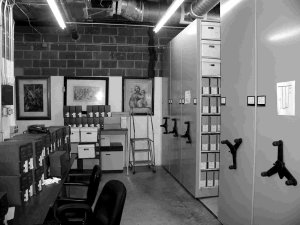
The Archives of The Catholic University of America was founded in 1949 to serve as the institutional memory of the University. It has the authority and obligation to acquire and administer records that have enduring evidential, legal, informational, and intrinsic value. Holdings date back to records documenting the founding of the university in the 1880s and extend forward to include files, photographs, and films detailing its growth and operations into the 21st century.
The Archives is a resource for administrators seeking important legal documents, professor researching departmental histories, public relations looking for old photographs, alumni searching for information on former students, students who want to examine university publications, and all others interested in any aspect of Catholic University's past.
Record types described are as follows:
-
1. Annual Reports
Description: Annual report of the originating department
Retention: 5 years
Disposition: Transfer to University Archives
Notes: Historical Value
-
2. Minutes
Description: Minutes of meetings of committees, councils, task forces, etc.
Retention: 5 years
Disposition: Transfer to University Archives
Notes: Historical Value
-
3. Correspondence
Description: Correspondence filed both chronologically and by subject as well as print outs of significant email messages
Retention: 5 years
Disposition: Transfer to University Archives
Notes: Historical Value
-
4. Student Records
Description: Students grades, course changes, correspondence, comprehensive exams, recommendations, etc.
Retention: Consult the Registrar's Office
Disposition: Consult the Registrar's Office
Notes: Registrar's Office arranges to digitze records. Paper version stored in the Archives but can only be accessed by Registrar's Office
-
5. Non-Academic Staff Records
Description: Personnel files
Retention: Consult the Human Resources Office
Disposition: Consult the Human Resources Office
-
6. Academic/Faculty Records
Description: Personnel files
Retention: Retain for active personnel
Disposition: Transfer to University Archives upon retirement or resignation
Notes: Historical Value though academic personnel records from the Provost's Office are considered the official record
-
7. Faculty Activity Reports
Description: Annual reports of Faculty activity, either by faculty or department name
Retention: 5 years
Disposition: Transfer to University Archives
Notes: Historical Value, material formerly kept in the academic personnel files
-
8. Faculty Tenure and Promotion Files
Description: Files assessing academic professional development
Retention: 5 years
Disposition: Transfer to University Archives
Notes: Historical Value, material formerly kept in the academic personnel files
-
9. Search Committee Files
Description: Job postings, candidate lists, final reports
Retention: 5 years
Disposition: Transfer to University Archives
Notes: Historical Value though employment applications of unsuccessful candidates (both international and domestic) need not be retained in the office beyond two years and may be destroyed thereafter.
-
10. Requisitions/Purchase Orders
Retention: 5 years
Disposition: Destroy
-
11. Budget Files
Description: Budget planning files, cash books and journals, cancelled checks, travel expenses, invoices, p-cards, etc
Retention: 5 years
Disposition: Destroy
-
12. Newspaper Clippings
Description: Newspaper clippings about the department and staff
Retention: 5 years
Disposition: Transfer to University Archives
-
13. Publications of the Office
Description: Newsletters, brochures, etc.
Retention: 5 years
Disposition: Transfer no more than three copies each to University Archives, dispose of excess copies
-
14. Publications of the University
Description: Yearbooks, newspapers, newsletters, brochures, etc.
Retention: As long as needed
Disposition: Consult with Archives staff
Notes: Record copies of these should already have gone or be going periodically to University Archives from office of creation
-
15. Audio/Visual Records
Description: Photographs, phonographs, audio cassettes, audio and video tapes, reel to reel films produced by or for the university in some capacity
Retention: As long as needed
Disposition: Transfer to University Archives after consultation with Archives Staff
-
16. Research Project Grant Files
Description: Files relating to funded research project grants
Retention: 5 years
Disposition: Transfer to University Archives
Notes: Sponsored Programs should have the file of record on this, but in lieu of a Universitywide records management program, the departmental files should be archived as well
-
17. Electronic Records
Description: Electronic documents including emails and material on web sites.
Retention: As long as needed
Disposition: Copy to disks and/or tape in the most current format possible, print paper copies when practical
Notes: Transfer to University Archives after consultation with Archives Staff.
About Your Responsibility
Records not selected by the archivist and thus not admitted to the archives remain your office's responsibility to house and dispose. We would be happy, however, to help you make decisions about what you should keep in your offices and what you might designate for destruction. You will most likely want to dispose of records that:
- are no longer helpful to you in running your office.
- have no permanent value and cannot be sent to the archives.
- have passed the legal "statue of limitations" for keeping them.
You are responsible for the moving and transfer of records, files and boxes, to the Archives. Please use 12" by 15" record center boxes. If you do not have boxes of this size they can be provided to you.
